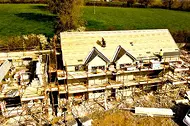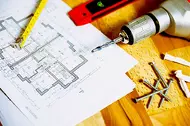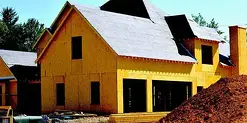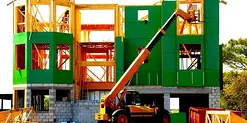The True Cost of Building a House in New Zealand: What You Really Need to Budget
 By
Trent Bradley
·
10 minute read
By
Trent Bradley
·
10 minute read

Building a house in New Zealand is one of the largest investments most families will ever make, yet many people underestimate the true costs involved. While it's easy to focus on the construction contract price, the reality is that home building costs in NZ extend far beyond what your builder quotes you.
Table of Contents
- Breaking Down New Zealand Home Building Costs
- Hidden Costs That Catch Builders Off Guard
- Regional Cost Variations Across New Zealand
- Construction Loan Costs and Considerations
- Common Budgeting Mistakes
- Strategies for Accurate Cost Planning
- Managing Cost Overruns
- Technology and Innovation Impact on Costs
- Getting Professional Cost Guidance
- Planning for Success
- Frequently Asked Questions
Key Takeaways
- Base construction costs in NZ range from $2,000-$2,500 per sqm for basic spec homes to $3,500-$5,000+ per sqm for high-end custom builds, but this is only part of total project costs
- Upgrades and variations for kitchens, bathrooms, flooring, and electrical features easily add $30,000-$100,000+ beyond base builder quotes, representing the biggest source of budget blowouts
- Pre-construction costs including land preparation, professional fees, consents, and council development contributions typically add $25,000-$70,000 before construction even begins
- Hidden costs catch builders off guard: site access challenges, unexpected ground conditions, weather delays, landscaping, and external works can add $30,000-$110,000+ to projects
- A $500,000 construction contract typically requires $600,000-$650,000 total investment when all associated costs, fees, and contingencies are properly budgeted
- Construction loan interest costs run $500-$2,000+ monthly on drawn funds, while temporary accommodation during 12-18 month builds adds $26,000-$78,000 to total expenses
- Inadequate contingency planning is a critical mistake—budget minimum 10-15% of construction costs for unexpected expenses like rock excavation, poor soil, or system variations
- Regional variations significantly impact costs: Auckland has higher council fees and labour costs, Wellington faces earthquake engineering premiums, while South Island often offers lower base construction rates
Understanding the complete financial picture is crucial for avoiding budget blowouts that could derail your dream home project. From hidden fees that catch first-time builders off guard to cost escalations during construction, being prepared for the true investment required can mean the difference between a smooth building experience and financial stress.
Recent market conditions have made accurate budgeting even more challenging, with material costs fluctuating, labour shortages affecting pricing, and supply chain disruptions creating unexpected delays and expenses. In this environment, comprehensive cost planning isn't just helpful – it's essential for project success.
Breaking Down New Zealand Home Building Costs
Base Construction Costs
The construction contract forms the largest component of your building budget, but understanding what's included – and more importantly, what's not – is crucial for accurate planning.
Typical Construction Cost Ranges:
- Basic spec homes: $2,000-$2,500 per square metre
- Mid-range builds: $2,500-$3,500 per square metre
- High-end custom homes: $3,500-$5,000+ per square metre
These figures represent the builder's contract price for a standard specification home, but they rarely tell the complete cost story.
What's Usually Included in Builder Quotes
Standard construction contracts typically cover the structural build, basic electrical and plumbing installation, standard fixtures and fittings, and basic floor coverings. However, the definition of "standard" varies significantly between builders and can lead to misunderstandings about what you're actually receiving for the quoted price.
Many builders provide base specifications that meet building code requirements but might not align with your expectations for finishes, fixtures, or functionality. Understanding exactly what's included prevents disappointing surprises when you discover your "included" kitchen is far more basic than you anticipated.
The Upgrade Trap
One of the biggest sources of budget blowouts occurs through upgrades and variations. Builders often quote competitive base prices but make profits through upgrades to fixtures, fittings, and finishes.
Common upgrade costs that catch builders off guard include kitchen upgrades ($10,000-$50,000 above basic), bathroom improvements ($3,000-$15,000 per bathroom), flooring upgrades ($5,000-$25,000), and electrical additions like extra power points, upgraded lighting, or smart home features ($2,000-$10,000).
These seemingly small improvements can quickly add $30,000-$100,000 or more to your original building contract, turning an affordable project into a financial stretch.
Hidden Costs That Catch Builders Off Guard
Pre-Construction Expenses
Before your builder even breaks ground, several significant costs must be budgeted for that many first-time builders overlook.
Land Preparation and Services: Site preparation costs vary dramatically depending on your section's characteristics. Level, serviced sections might need minimal preparation, while sloping or raw land could require extensive earthworks, retaining walls, and service connections costing $20,000-$100,000 or more.
Professional Fees and Consents: Architectural fees, engineering reports, geotechnical assessments, and building consent costs typically add $15,000-$40,000 to your project before construction begins. Council development contributions can add another $10,000-$30,000 in some areas.
Temporary Accommodation and Storage: If you're building on your existing property or need to relocate during construction, temporary accommodation costs can be substantial. Rental properties, temporary storage, and living expense increases during construction can easily cost $500-$1,500 per week.
During Construction Surprises
Site Access and Logistics: Difficult site access can increase construction costs through higher crane hire fees, material delivery challenges, and extended labour time. Narrow sections, steep driveways, or limited space for material storage can add thousands to your build cost.
Ground Conditions: Unexpected ground conditions represent one of the most significant sources of cost overruns. Rock requiring blasting, poor soil requiring special foundations, or high groundwater levels necessitating drainage systems can add $10,000-$50,000 or more to your project.
Weather Delays: New Zealand's weather can significantly impact construction timelines and costs. Extended wet periods delay progress while you continue paying interest on construction loans and potentially temporary accommodation costs.
Finishing and Final Costs
Landscaping and External Works: Many builders focus on the house itself without adequately budgeting for external works. Driveways, paths, retaining walls, fencing, and landscaping can easily cost $20,000-$60,000 or more, depending on your section and preferences.
Connection and Commissioning: Final connections for services, commissioning of systems like heat pumps, and completing compliance requirements can add several thousand dollars to your final costs.
Regional Cost Variations Across New Zealand
Auckland Building Costs
Auckland's building costs typically exceed national averages due to higher land values, increased regulatory requirements, and competitive labour markets. Council fees and development contributions are often higher, while logistics costs for materials can be elevated in some areas.
Complex consenting processes and strict design requirements can increase professional fees, while the competitive construction market can drive labour costs above other regions.
Wellington Construction Challenges
Wellington's earthquake requirements often increase structural costs, while the challenging topography can significantly impact site preparation expenses. Wind considerations might require additional engineering and special construction techniques.
Limited land availability means builders often work on difficult sites, increasing access costs and construction complexity.
South Island Opportunities
South Island construction costs are often lower than North Island equivalents, though this varies significantly between urban centres and rural areas. Material transport costs might be higher in some remote areas, while labour availability can affect pricing.
Construction Loan Costs and Considerations
Interest During Construction
Construction loans typically charge interest only on drawn funds, but managing cash flow during construction requires careful planning. Interest costs can range from $500-$2,000+ per month depending on your loan amount and current rates.
Unlike traditional mortgages, construction loans require active management as funds are drawn down at various construction stages. This creates variable interest costs that many builders find challenging to budget for accurately.
Progress Payment Management
Construction loans release funds in stages based on building progress, but managing these payments effectively requires understanding both your construction contract and loan requirements. Delays in progress payments can hold up construction and increase costs.
Some builders find they need additional funds between progress payments to maintain cash flow, particularly if variations increase costs above budgeted amounts.
End-of-Build Financial Requirements
Converting from construction to permanent financing often requires additional funds for final completion items, council compliance certificates, and any cost overruns not covered by your construction loan.
Common Budgeting Mistakes
Underestimating Total Project Costs
Many builders focus primarily on the construction contract value without adequately budgeting for the numerous additional costs required to complete their project. A $500,000 construction contract might require $600,000-$650,000 in total investment when all costs are included.
Inadequate Contingency Planning
Construction projects rarely proceed exactly as planned. Inadequate contingency budgets – typically at least 10-15% of construction costs – leave builders vulnerable to financial stress when unexpected costs arise.
Ignoring Holding Costs
The time between land purchase and moving into your completed home can extend 12-18 months or more. Interest on land loans, rates, insurance, and temporary accommodation costs during this period can total tens of thousands of dollars.
Lifestyle Cost Increases
Many builders underestimate how construction affects their regular living expenses. Eating out more frequently, additional travel costs, and temporary accommodation expenses can significantly increase monthly budgets during construction.
Strategies for Accurate Cost Planning
Comprehensive Cost Analysis
Successful builders develop comprehensive cost breakdowns that include all project phases from land acquisition through final completion. This includes construction costs, professional fees, council charges, service connections, temporary accommodation, and contingencies.
Multiple Builder Quotes
Obtaining detailed quotes from multiple builders helps identify what's standard inclusion versus optional extras. However, comparing quotes requires careful analysis to ensure you're comparing equivalent specifications and inclusions.
Fixed Price Versus Cost Plus Contracts
Understanding different contract structures helps you choose the approach that best manages cost risk for your situation. Fixed price contracts provide certainty but might include higher margins, while cost-plus arrangements offer transparency but require more active cost management.
Managing Cost Overruns
Early Warning Systems
Successful builders establish systems for monitoring costs throughout construction, identifying potential overruns early when options for management are still available.
Variation Management
Understanding how to evaluate and manage variations helps control costs while still achieving your desired outcome. Some variations are essential, while others might be deferred to future phases.
Financing Flexibility
Having access to additional funding for unexpected costs or desirable variations can prevent delays and allow you to take advantage of opportunities that arise during construction.
Technology and Innovation Impact on Costs
Building Information Modelling (BIM)
Advanced planning tools can help identify potential cost issues before construction begins, though they might increase upfront professional fees while reducing overall project risk.
Prefabrication and Modern Methods
New construction technologies might offer cost savings through reduced labour requirements and shorter build times, though they might require different financing approaches.
Smart Home Integration
Planning for smart home features during construction is more cost-effective than retrofitting, but requires understanding rapidly evolving technology and future-proofing strategies.
Getting Professional Cost Guidance
Quantity Surveyors
Professional quantity surveyors can provide detailed cost estimates and ongoing cost management services, particularly valuable for complex or high-value projects.
Construction Finance Specialists
Understanding how construction financing works and integrating it with your cost planning ensures you have adequate funding throughout your building journey.
Value Engineering
Professional guidance on achieving your desired outcomes within budget constraints can help optimise your investment while maintaining quality and functionality.
Planning for Success
Building a house in New Zealand requires comprehensive financial planning that extends far beyond the construction contract price. Understanding home building costs in NZ means recognising the numerous components that contribute to your total investment and planning accordingly.
The most successful building projects start with realistic budgeting that includes all potential costs, adequate contingencies, and flexible financing arrangements. While it's impossible to predict every expense that might arise, comprehensive planning significantly reduces the risk of budget overruns that could compromise your project or create financial stress.
Accurate cost planning isn't just about avoiding surprises – it's about making informed decisions that optimise your investment while achieving your lifestyle and quality goals.
If you're serious about understanding the complete cost picture for your building project and want professional guidance on budgeting and financing strategies, contact Luminate Finance today. Our construction-to-permanent lending specialists understand all aspects of building costs and can help you develop comprehensive financing solutions that support your entire building journey.
Frequently Asked Questions
What costs are typically NOT included in a builder's quote?
Builder quotes rarely include landscaping and driveways ($20,000-$60,000), fencing ($5,000-$15,000), final service connections and commissioning ($3,000-$8,000), council development contributions ($10,000-$30,000), retaining walls for sloped sections ($15,000-$50,000), and site preparation beyond basic leveling. Professional fees for architects, engineers, and geotechnical reports ($15,000-$40,000) are separate. Upgrades beyond basic specifications—better kitchens, bathroom fixtures, flooring, lighting, or additional power points—add substantial costs. Builder quotes focus on the house structure itself, leaving these essential completion costs for you to budget separately. Always request detailed specification sheets showing exactly what's included before comparing quotes.
How much should I budget for the complete project beyond the construction contract?
Plan for 20-30% above your construction contract value to cover all additional costs. On a $500,000 build, budget $600,000-$650,000 total. This includes pre-construction costs (consents, professionals, site prep: $25,000-$70,000), construction loan interest during build ($6,000-$24,000), landscaping and external works ($20,000-$60,000), upgrades and variations ($20,000-$80,000), temporary accommodation if needed ($26,000-$78,000 over 12-18 months), and 10-15% contingency for unexpected costs ($50,000-$75,000 on $500k build). Higher-end builds or difficult sites require budgets at the upper end of these ranges. Conservative budgeting prevents financial stress when inevitable unexpected costs arise.
What's a realistic contingency percentage for building in New Zealand?
Budget minimum 10-15% of total construction costs as contingency—on a $500,000 build, that's $50,000-$75,000. Increase to 15-20% for complex sites, sloped sections, or if you're making design decisions as construction progresses. Contingencies cover unexpected ground conditions (rock, poor soil, high water tables), weather-related delays extending your construction loan interest, variation costs from design changes, price increases if construction extends beyond initial quotes, and final completion items to achieve council sign-off. First-time builders should budget toward the higher end as they're more likely to make changes during construction. Unused contingency becomes instant equity in your new home—it's far better to over-budget than face funding shortfalls mid-construction.
How do I avoid budget blowouts from upgrades and variations?
Lock in detailed specifications before signing your building contract, including specific brands, models, and finishes for all fixtures, fittings, and materials. Visit display homes or completed projects to understand what "standard inclusions" actually mean—basic builder-grade finishes often disappoint. Create a priority list ranking must-have versus nice-to-have upgrades, allocating specific budgets to each category. Resist impulse upgrades during construction—every "small" $2,000-$5,000 addition compounds quickly. If you do make changes, require written quotes before approving variations and adjust your budget immediately. Consider selecting higher specifications upfront rather than upgrading mid-build, as builder variation charges typically run 20-50% higher than original pricing for equivalent items.
What are typical construction timeframes and how do delays affect costs?
Standard new home construction in NZ takes 6-12 months from ground-breaking to completion, though complex builds or difficult sites extend to 12-18 months. Every month of delay costs you continued construction loan interest ($500-$2,000), temporary accommodation if applicable ($2,000-$6,000), extended insurance and rates ($300-$800), and postponed move-in delaying your life plans. Weather delays are inevitable in NZ—plan for 2-4 weeks of weather-related construction downtime. Material supply delays have increased recently, potentially adding weeks or months to projects. Builder scheduling conflicts, consent variations, or unexpected site conditions also create delays. Build 2-3 months buffer into your timeline expectations and budget accordingly for extended holding costs.
Should I choose a fixed price or cost-plus building contract?
Fixed price contracts provide budget certainty with predetermined total costs, transferring cost overrun risk to the builder—ideal for first-time builders with tight budgets who need predictable financing. However, builders include 10-20% risk premiums in fixed prices, and variation charges for changes run 20-50% higher than base rates. Cost-plus contracts charge actual costs plus builder margin (typically 15-25%), offering transparency and flexibility for design changes but requiring active cost management and creating budget uncertainty until completion. Choose fixed price if you need certainty for bank financing, have limited construction experience, or can't accommodate cost variations. Consider cost-plus if you're experienced with construction, want design flexibility during build, and can actively manage costs. Many builders offer hybrid approaches combining fixed structural pricing with cost-plus finishes.
Ready to build your dream home with confidence? Understanding true building costs is the first step toward successful project completion. Contact Luminate Finance to discuss how our construction-to-permanent financing expertise can help you plan, budget, and fund your building project effectively.

Trent Bradley
Trent Bradley is a New Zealand financial advisor specializing in property-backed finance and investment consulting. With over 26 years of experience running his mortgage broking business, he has helped wholesale investors access high-yield property-backed loan opportunities. For the past 12 years, Trent has led Luminate Finance, a New Zealand finance company dedicated to connecting investors with secure property investment solutions.










